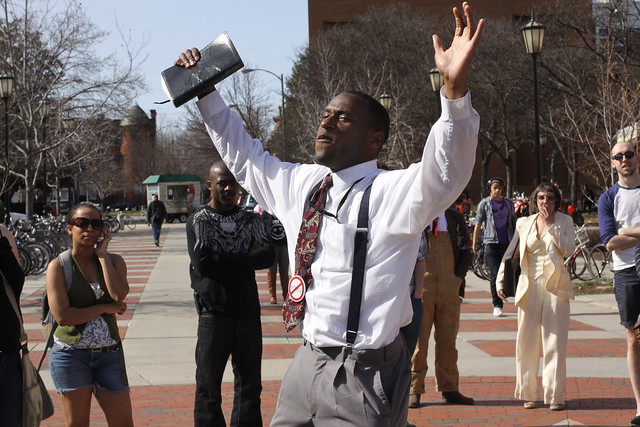In Poulos v. New Hampshire, 345 U.S. 395 (1953), the Supreme Court upheld the conviction of Jehovah’s Witnesses who had been prosecuted under an ordinance of Portsmouth, New Hampshire, for holding a religious service in a public park without a license, finding it was not in violation of the Witnesses’ First Amendment right to free exercise of religion. The decision is problematic because the Court recognized that the city council had unreasonably denied the Witnesses use of the park on a previous occasion.
Poulos said fine for conducting a religious service without permit violated First Amendment
William Poulos contended that his fine for conducting a religious service without a permit violated the First Amendment. A municipal court disagreed and imposed a $20 fine. Poulos initially appealed to a New Hampshire superior court and then bypassed the superior court with an appeal directly to the New Hampshire Supreme Court, which also ruled against Poulos. He then appealed to the U.S. Supreme Court.
Court upheld license requirement
Justice Stanley F. Reed’s decision for the Court relied on the Court’s decision in Cox v. New Hampshire (1941), where it had decided that a state had the right to issue licenses for parades as long as such licenses were “not the kind of prepublication license deemed a denial of liberty since the time of John Milton but a ministerial, police routine for adjusting the rights of citizens so that the opportunity for effective freedom of speech may be preserved.” Reed observed, “The principles of the First Amendment are not to be treated as a promise that everyone with opinions or beliefs to express may gather around him at any public place and at any time a group for discussion or instruction.”
Prior licensing cases had centered not on the invalidity of licensing per se but on the vesting of arbitrary authority in licensing officials. Reed argued for the compatibility of “freedom and order”and distinguished between “regulation and suppression.” In cases in which laws are facially invalid, the Court had permitted individuals to act on the basis that the laws effectively did not exist, but when the laws were valid, and were simply enforced arbitrarily, individuals should use the appeals process rather than breaking the law.
Justice Felix Frankfurter concurred in the result but thought the Court had decided some issues that were not properly posed to it. Justices Hugo L. Black and William O. Douglas dissented. Black objected that the Court “holds Poulos can be branded a criminal for making a talk at the very time and place which the State Supreme Court has held its licensing officials could not legally forbid.” He argued that freedom of speech deserves “special protection” that exceeds that of other businesses that are licensed. Douglas viewed the Portsmouth licensing requirement as an impermissible “prior restraint,” which granted too much discretion to licensing officials.
In Thomas v. Chicago Park District (2002), the Supreme Court upheld a procedure that required licenses for activities in a park based on time, place, and manner considerations.
John Vile is a professor of political science and dean of the Honors College at Middle Tennessee State University. He is co-editor of the Encyclopedia of the First Amendment. This article was originally published in 2009.

